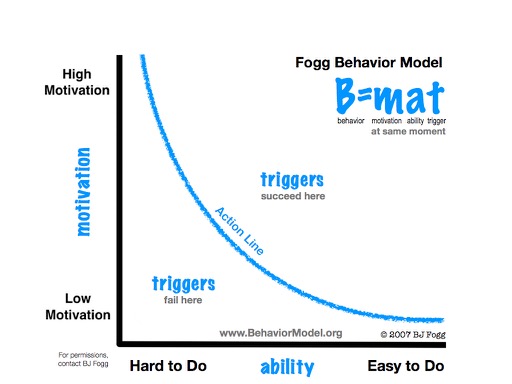Note: This is a guest post by Anand Srinivasan, founder of Hubbion
There are dozens of concerns a prospective customer might have when they are shopping on your website.
Would the product actually do what it promises to do? Can they trust you with their credit card details? Would you actually ship the product and not run away with their money? Can your company be trusted on your shipment and return guarantees?
‘Purchasing anxiety’ is the term used to refer to these thoughts, and is many times the reason why a customer might abandon their cart midway through the buying process. Not surprisingly then, such anxieties are more common on startup and small business websites than for big retailers like Amazon. So what’s really causing this anxiety? Let us look at the science behind this.
In 2013, filmmaker and author Errol Morris, in association with the New York Times, conducted an experiment to study the link between reader perception and typefaces. His study showed that readers are more likely to agree with an essay if it were written with the Baskerville font instead of Comic Sans or Helvetica.

It is not difficult to see why. The Baskerville font shown above demonstrates a level of authority that Comic Sans does not. If you were a buyer who is just about to spend a hundred dollars on a product, it is easy to trust a sales copy written with Baskerville over one written in Comic Sans.
Morris’ experiments are thus relevant not only for newspapers but also for eCommerce stores trying to persuade visitors to buy their products. Sometimes, even seemingly trivial elements like the font or your brand name can have an impact on the way visitors engage with your website. This is because such elements influence your perception of the product and the brand. A brand that does not exude credibility often sees their ecommerce conversions go down.
Even seemingly trivial elements like the font or your brand name can have an impact on the way visitors engage with your website.
But before we look at ways to bring a visitors’ anxiety down, it is important to know what makes them convert in the first place.
Dr. BJ Fogg from Stanford University coined what is now known as the Fogg Behavior Model (FBM). According to this theory, the trigger for any behavior comes from three specific elements – Motivation, Ability, and Trigger (B=mat).

Applying the FBM theory to eCommerce conversions, you can say that for conversion to happen, the prospective buyer must have sufficient motivation, ability and must be exposed to the right trigger. Your motivation to buy a gift for your spouse, for instance, dramatically increases when you get closer to their birthday. At the same time, no amount of motivation is enough to gift your husband his favorite car if you cannot afford it. The trigger to convert can come in the form of a rightly worded ad copy or CTA.
A highly motivated visitor who is exposed to the right triggers and has the ability to buy could convert even if you do not demonstrate adequate trustworthiness. This is the reason why a lot of scams still work – people who fall for the ‘get rich quick’ schemes are sufficiently motivated and do not stop due to their purchasing anxieties. That is however not true for regular product purchases where there are dozens of rival stores vying for the customer’s attention. Conversion in these cases only happens if the store demonstrates adequate credibility to reassure potential customers.
According to clinical psychologist Dr. Elvira Aletta, anxiety thrives on ignorance. By educating a prospective customer and addressing their concerns, you help fend off the anxiety that they may have before placing an order. The bad news, however, is that there is no foolproof method to fend off all kinds of purchasing anxieties. It depends to a great extent on your industry, the products you sell, the pricing and the buyer in question.
Product Details
A buyer deserves to know everything about the product, not just the advertised claims. This means that in addition to providing the complete specifications and details about the product, you should also include feedback and reviews from other customers and any third party product ratings. If you are an apparel store, you may also encourage past customers to share pictures of them wearing these accessories – this further helps a prospective buyer with their purchasing decision and brings their anxiety levels down.
Pricing And Shipping Details
The one thing that holds a customer back even after they are convinced about the quality of the product is the price. This, of course, does not apply to all businesses and some industries are more price-elastic than the others. Convincing customers that they are indeed getting a good deal is thus paramount for some stores. There are a couple of ways to do this – you could either offer a discount coupon to reduce sticker shock or you could make shipping free. It is a good idea to have a dedicated shipping page where you explicitly mention the shipping options, cost of shipping, shipment duration, handling time and restrictions. No matter what you do, make sure that the customer is not made to pay more than what they think they would be paying.
Business Details
The other most important thing that worries a buyer is your business credibility. Many online stores regard pages like ‘About Us’ and ‘Contact’ as a mere after-thought. In reality, though, a lot of visitors look these pages up to assess your business credibility. A good ‘About Us’ page should include your company history, photos, and profile of your team members and well-made visuals to highlight your business achievements, clientele and so on. Do not make the mistake of merely including a web form in your ‘Contact’ page. Make it a point to offer multiple channels of communication (like email, snail mail, phone support, and so on). This demonstrates that you are here to stay and are not going to run away with the customers’ money.
Author Bio: Anand Srinivasan is the founder of Hubbion, a free project management tool for small businesses. Hubbion has been ranked in the top 20 in its category by Capterra.




